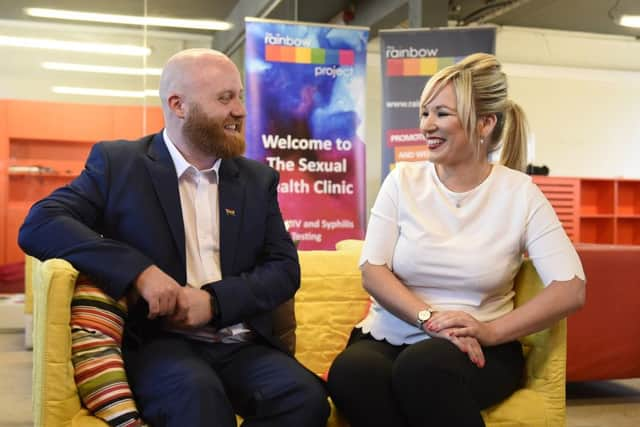UK blood has become safer since lifetime gay blood band ended: Department of Health


Northern Ireland is set to bring its own policy into line with that of England, Scotland and Wales from this September, meaning that gay men will be able to give blood 12 months after they last had sex with another man.
The change is the first major act of the newly-appointed Sinn Fein health minister Michelle O’Neill.
Advertisement
Hide AdAdvertisement
Hide AdThe three DUP ministers who held the post before her had all opted to retain the lifetime ban on donations from men who have had sex with other men, regardless of the change on the mainland UK.


DUP leader Arlene Foster declared last week that she was now “happy” to back the change in the law, because new evidence had recently come to light allaying fears that a relaxation of the rules would lead to more infected blood.
The News Letter asked the Department of Health exactly what the new evidence was.
It said that “two significant new sets of data indicated that the risk to blood safety from MSM donations had in fact decreased since the change of policy in Great Britain”.
MSM stands for “men who have had sex with men”.


The two strands of evidence were as follows:
Advertisement
Hide AdAdvertisement
Hide AdAll blood samples are screened for problems when they are received by the health authorities. The Department of Health said that “surveillance data derived from the tests carried out on every blood donation in England, Scotland and Wales since the policy change [show] that there fewer infections are being detected in donated blood”.
It said the second piece of evidence was a “major survey of blood donors” carried out after the 2011 change in the law (but did not offer specific details of what these results were).
Speaking on Thursday, shortly after the change in the law for Northern Ireland was announced, veteran DUP man Sammy Wilson (MP for East Antrim) voiced a note of caution about the relaxation of the law, saying: “There are other countries that still see it as a risk.”
An NHS report in October 2015 gives the numbers of confirmed transfusion-transmitted infections received by the “NHS Blood Transfusion / Public Health England Epidemiology Unit” each year.
Advertisement
Hide AdAdvertisement
Hide AdIt shows that across the UK in 2011 there were two confirmed cases of infected blood donations being used for transfusion purposes.
In 2012, there were three such cases in the UK; in 2013 there were none; and in 2014 there was one.
The last confirmed case reported of the HIV virus being transmitted via infected blood in the UK was in 2002, according to the data.
The data is here, in table 2.1 (the unbracketed figures are the number of individuals who gave infected blood, and the figures in brackets represent the numbers of people who were then subsequently infected).
Advertisement
Hide AdAdvertisement
Hide AdA spokeswoman for the NHS Blood and Transplant division, based in England, was asked if there had been any notable increase in the overall number of people giving blood after the law was changed in 2011 to permit a greater number of gay men to donate there.
She said that there had been no increase, because they have pursued a policy of trying to reduce the overall number of donations recieved by the public at large, as improvements in surgical techniques have led to a cut in demand – a trend which is replicated across much of the world.